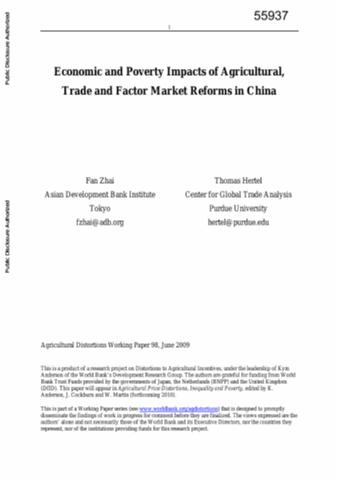Resource information
Capitalizing on the most recent estimates of agricultural price distortions in China and in other countries, this paper assesses the economic and poverty impact of global and domestic trade reform in China. It also examines the interplay between the trade reforms and factor market reforms aimed at improving the allocation of labor within the Chinese economy. The results suggest that trade reforms in the rest of the world, land reform and hukou reform all serve to reduce poverty, while unilateral trade reforms result in a small poverty increase. Agricultural distortions are important factors in determining the distributional and poverty effects of trade reform packages, although their impacts on aggregate trade and welfare appear to be small. A comprehensive reform package which bundles the reforms in commodity and factor markets together may benefit all broad household groups in China.


